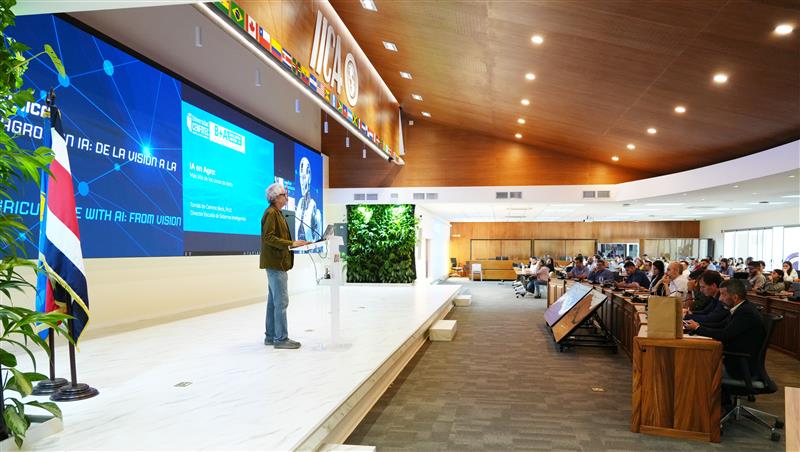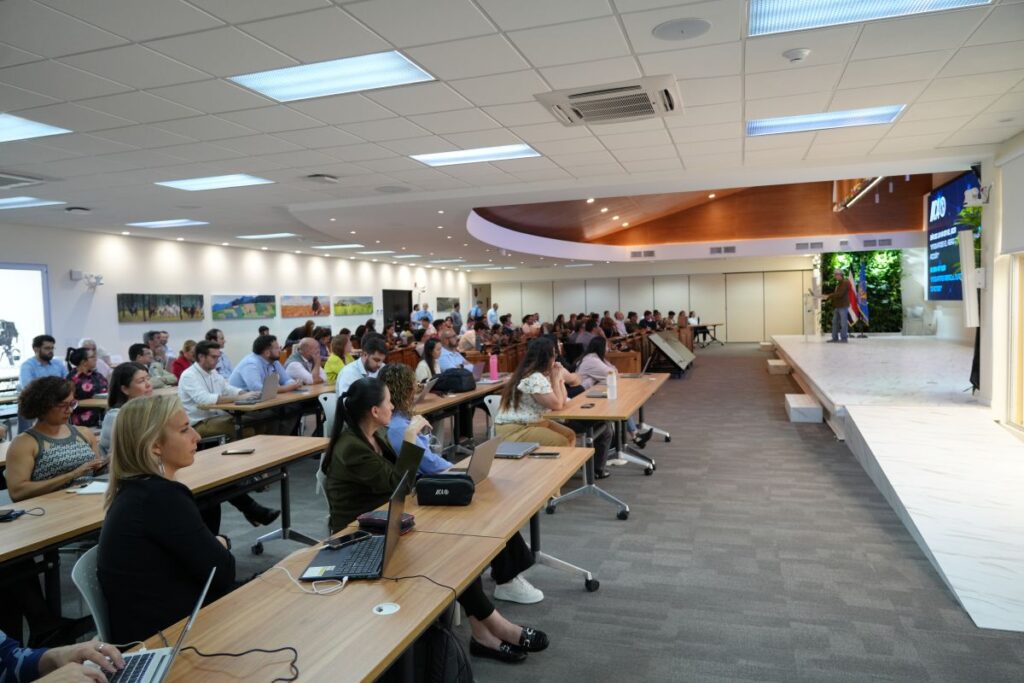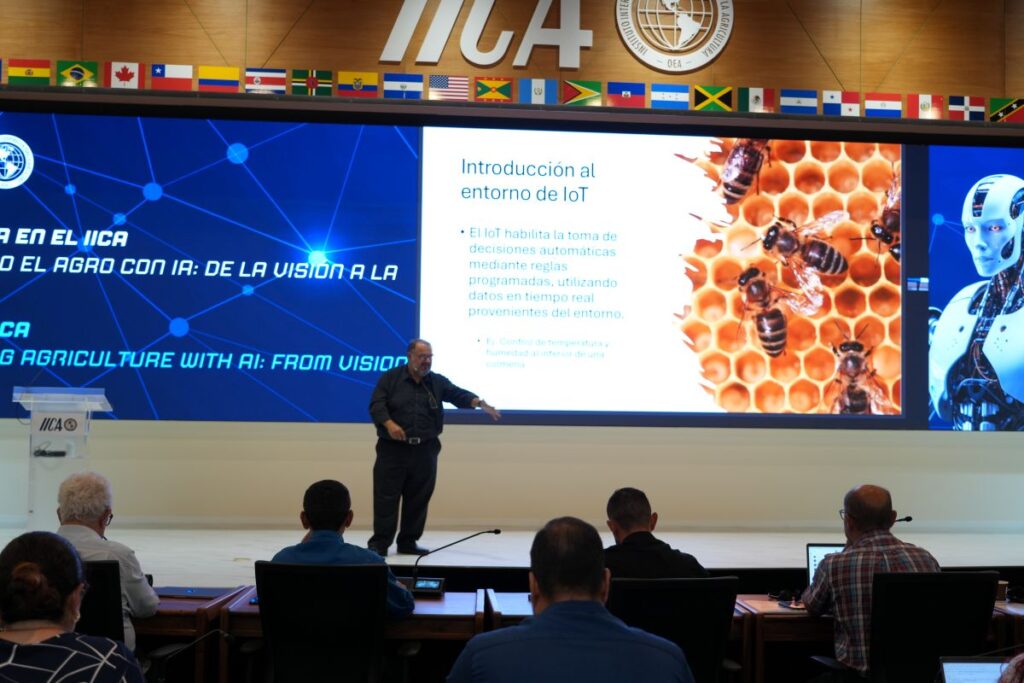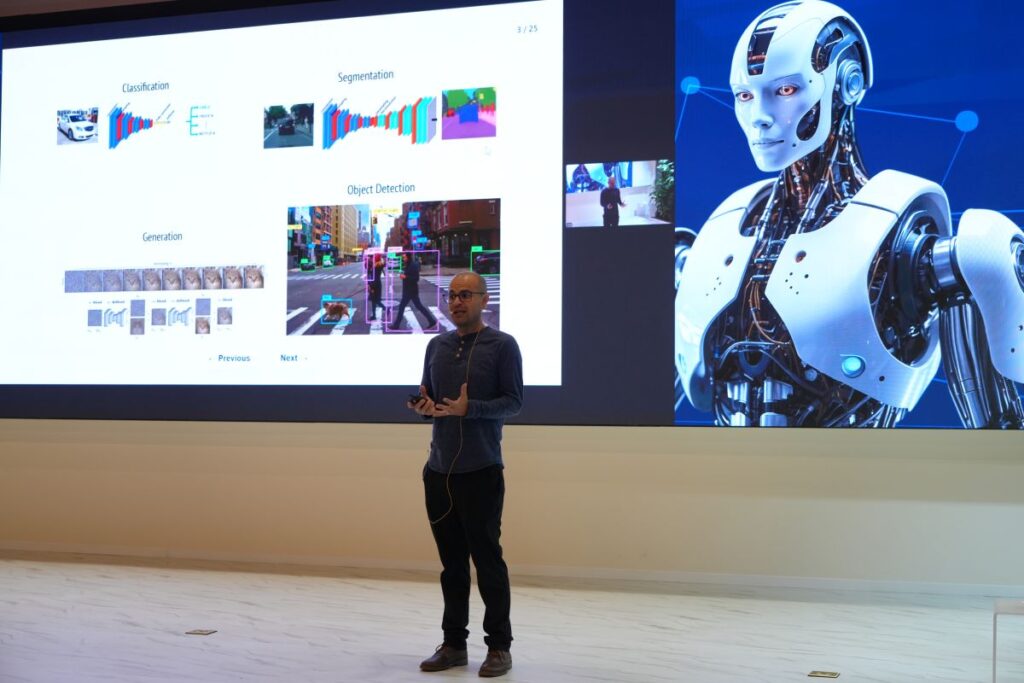
San José, 2 October 2025 (IICA). Artificial intelligence (AI) is paving the way to transform agriculture in Latin America and the Caribbean (LAC). Its adoption, however, hinges on access to quality data, digital connectivity, farmer training, greater investment in research, development and technological infrastructure, the creation of an institutional and innovation culture, and the establishment of clear ethical and regulatory frameworks that build trust and ensure responsible use.
This was the central message at the event Innovating Agriculture with AI: From Vision to Action, which marked the close of the 2025 Digital Agriculture Week (DAW), organized by the Inter-American Institute for Cooperation on Agriculture (IICA), together with the Inter-American Development Bank (IDB), CAF–Development Bank of Latin America and the Caribbean, Bayer, the Cooperative Program for the Technological Development of Agrifood and Agro-Industry in the Southern Cone (PROCISUR), the University of Córdoba in Spain and AWS.
The gathering, known as the AI Day at DAW 2025, brought together more than 200 participants in hybrid format—both in-person and virtual—including experts, academics, researchers and IICA officials, with the aim of raising awareness of AI’s transformative potential for the agricultural sector.
Over the course of two days, participants shared real-world experiences, emerging technologies and strategic reflections on the use of artificial intelligence in agriculture. Nine high-level presentations addressed diverse topics such as precision farming, automation, data use, connectivity, productivity, sustainability and organizational culture.
The presentations demonstrated that AI is already embedded in agricultural production, with applications ranging from smart irrigation and drone-based crop monitoring to the use of low-cost sensors and climate prediction models.

Experts agreed that the key lies in developing open, scalable solutions tailored to local realities, ensuring that producers are at the center of the digital transformation in the region—and that AI should empower rather than exclude.
“The region must take ownership of these technologies, developing them in an open, accessible way and adapted to its reality. Democratizing knowledge is key to moving forward; technology should not intimidate, it should empower. When a farmer becomes the architect of solutions and AI amplifies their capabilities, that is true transformation”, stressed Tomás de Camino Beck, Director of the School of Intelligent Systems at Cenfotec University in Costa Rica.
“AI is no longer the future; it is the tool of the present. It enables process automation, resource optimization and decision-making tailored to the field”, said Julián Mauro, co-founder and Director of the Argentine AgTech Autoplants, a technological solution that leverages artificial intelligence to optimize water use in agriculture by predicting rainfall, frosts and irrigation needs.
During the meeting, experts also emphasized that data is the gold of artificial intelligence, and that its quality, management and contextualization are essential for the success of any model.
“Data is the gold of artificial intelligence. Without reliable information, any model loses value. AI models are based on data, so they must be good; otherwise, they become obsolete. This goes hand in hand with the Internet of Things (IoT). Dialogue and interdisciplinary work are also indispensable for the development of artificial intelligence solutions and models to drive agricultural innovation”, argued Jesús Bejarano Quesada, professor at the School of Biosystems Engineering of the University of Costa Rica (UCR).

“AI and IoT are symbiotic; together they enable automatic decision-making based on real data”, highlighted Fulvio Lizano Madriz, professor at the National University (UNA) and the Distance State University (UNED) of Costa Rica, who presented at the event a prototype of a smart hive for meliponiculture, capable of measuring temperature, humidity, light and air quality.
The application of AI in crops also had a prominent place in the presentations, showing that there is no reason to fear the use of these technological tools.
Fabián Fallas Moya, professor and researcher at UCR and the Costa Rica Institute of Technology (TEC), presented PineSORT, a drone-based system for counting pineapples, which enables more precise harvest planning. Rodrigo Herrera Garro, co-founder and Chief Technology Officer of AinnovaTech, presented a solution for automated counting during the flowering stage of the same crop.
“The democratization of knowledge is essential for scaling solutions like this. Bringing academia and industry closer together can open more doors in Latin America. At the same time, investment is needed, another of the major challenges”, said Moya.
“AI helps us connect worlds: medicine, agriculture, engineering and more. The key is having quality data and the will to innovate. Farmers are open to trying, they don’t close the door, and that creates opportunities”, added Garro.

Ally, not threat
For his part, Adrián Miranda Cordero, Senior Solutions Engineer at Cloudera, urged not to “fear the use of AI”. “Technology is not the enemy; it is an ally for making better decisions”, he said.
The event also highlighted that connectivity remains one of the greatest barriers. Bridging the digital divide in rural areas will be essential to ensure that artificial intelligence tools effectively reach farmers.
Another axis of discussion was the need for ethical and regulatory frameworks to accompany technological adoption and the promotion of both public and private investment in research and development, so that Latin America and the Caribbean do not fall behind in knowledge generation.
“Public investment in R&D is key for AI to generate well-being and not deepen inequalities. We must activate all sectors of society; we need that systematic effort, a regulatory framework at the regional level and greater integration in terms of access to funds. Artificial intelligence can accelerate innovation, but without clear public policies, the region will be left behind”, warned Saúl Calderón Ramírez, professor and researcher at the School of Computer Engineering at TEC.
Emmanuel Picado, Manager of the Information/Communication Technologies and Digital Agriculture Division at IICA, concluded that AI is a fundamental issue for the Institute, and that the commitment is to go beyond vision and move into action, so that artificial intelligence becomes a driver of inclusion, productivity and resilience in the agriculture of the Americas.
“We must learn more, train ourselves, create. We want to foster and build a culture of innovation by leveraging AI”, he concluded.
More information:
Emmanuel Picado, Manager of Information and Communication Technologies and Digital Agriculture at IICA.
emmanuel.picado@iica.int











